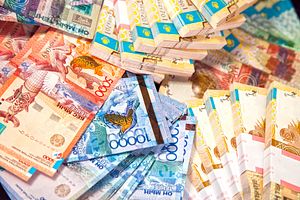When Kazakhstan loosened the trading band for its currency, shifting the upper limit to 198 tenge per dollar in July, the government couched the change in terms of moving toward a free-floating currency though international observers looked at it as more a response to Russia’s persistent ruble troubles and low oil prices. This week, however, the tenge is pushing that limit and some expect the currency to hit 200 per dollar in the coming weeks.
The recent, sudden, spike in the tenge is linked, by Bloomberg, to the yuan’s recent fluctuations and the shaking of the Chinese stock market. Bloomberg notes that the yuan’s drop last week put pressure on the country’s trading partners, making their exports less competitive. Economic trouble for its two biggest trading partners bodes ill for Astana. The devaluation of the tenge to 197.28 per dollar by 5:10 p.m. in Almaty, as reported by Bloomberg, was “the steepest retreat since the central bank … let it drop about 20 percent in February 2014.”
As I wrote in May, when the World Bank released its projections for Kazakhstan’s future growth rates, recovery of the Kazakh economy is possible, but inextricably linked to Russia, China, and oil prices. While the IMF recently revised its forecast for Kazakhstan’s 2016 growth to 3.25 percent (the World Bank pegged 2016’s projection at 2.8 percent in May), it did so on the assumption that oil prices and Russia’s economy would recover and the Kashagan field would resume production, none of which are certainties.
Kazinform reports that the Kazakh President Nursultan Nazarbayev, in a meeting on the economic situation, has instructed the government to reduce the national budget deficit by 1 percent–in February he instructed the government to slash budgets by 10 percent. He also reportedly placed a “moratorium on various projects” until 2018. The target appears to be focused on new projects—not projects already in progress. Kazakhstan has spent billions on various projects and large events designed to both bolster the country’s international image and highlight investment opportunities but planning for EXPO 2017 Astana has been plagued by corruption and while Almaty lost the 2022 Winter Olympic Games to Beijing (which may be a boon, given the history of Olympic games bringing momentary money and leaving decaying empty stadiums), the country has spent plenty building infrastructure for other large sporting events near the old capital.
As Kazpravda reports, Nazarbayev is well aware of the difficulties Kazakhstan faces: low oil prices aren’t expected to recover any time soon, access to investment and capital is limited at the moment, and weak demand in Astana’s major partners will hold back Kazakhstan’s economy. The revised July trading band was based on oil prices between $50 and $60 per barrel. Nazarbayev apparently noted the need to take even lower prices into account—$30 to $40 per barrel. Wednesday, Brent crude was trading at $48.83 per barrel.
Tengrinews’ coverage of the tenge’s sudden movement is worth reading. Bloomberg places the 4.5 percent devaluation in context–it is the largest devaluation in the tenge since February 2014’s 20 percent drop–but Tengrinews conveys the feeling of uncertainty that comes with fluctuations in currency exchanges:
Today’s unexpected change of the exchange rate has got people worried and distrustful to the National Bank.
Astana exchange offices have changed their rate boards several times today. In the beginning of the day things were relatively calm, but as the buzz and uncertainty were escalating, by lunch time some exchangers stopped selling dollars, while others could not decide on the rate and were changing their boards every 5-10 minutes.
































